Chapter 37: Penile Tumors – Flashcards
Unlock all answers in this set
Unlock answersquestion
What are 6 types of pre-malignant penile lesions?
answer
1) Cutaneous horn 2) Pseudoepitheliomatous, micaceous, and keratotic balanitis 3) Male lichen sclerosus (BXO) 4) Condylomata acuminata (HPV lesion) 5) Bowenoid papulosis 6) Kaposi sarcoma 7) Buschke-Lowenstein tumor
question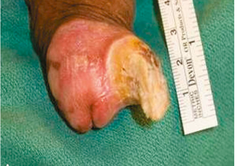
What is a cutaneous horn? How do you treat?

answer
Overgrowth and hyperkeratosis of any pre-existing lesion, protrudes out. Associated with HPV-16. Treat: exise, negative margin around base, close f/u PIC: horn with underlying SCC
question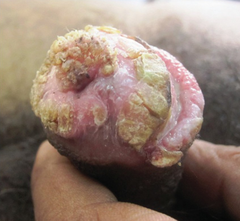
What is pseudoepitheliomatous, micaceous, keratotic balanitis, and how to treat?

answer
Hyperkeratosis, micaceous (thin scales) growths on glans. Treat: excise, laser, or cryo; close f/u
question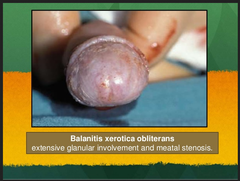
What is BXO? How does it present?

answer
White, indurated, sclerotic patches on glans, can involve meatus. Can cause erosions and stenosis. Etiology of BXO is unknown (maybe Borrelia burgdorferi?). Presents: pain, dyspareunia, painful erections
question
How do you treat BXO?
answer
Clobetasol propionate cream X 2-3 months. F/u closely, as SCC still a RF after treatment.
question
What is a common complication of BXO that might require ongoing management?
answer
Meatal stenosis. Manage with serial dilations, steroid injections, or even recon
question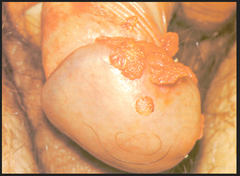
What is condylomata acuminata? What types of HPV are associated with penile cancer?

answer
Soft papillary HPV lesions on glans, shaft, and prepuce. Keratinized tissue overlying papillary fronds. Themselves are benign, but have been associated with SCC. Types 16 and 18
question
What are 4 RF for contracting HPV?
answer
1) Uncircumcised 2) Smoker 3) Lack of condom 4) High number of sexual partners
question
To detect subclinical HPV of the penis, what can you apply in clinic?
answer
5% acetic acid (lesions turn white, are flat)
question
What are treatments for condylomata acuminata (6)? Which one is the treatment of choice? What should you do prior to applying podophyllotoxin?
answer
1) podophyllotoxin 0.5% gel 2) trichloroacetic acid 3) cryotherapy 4) electrofulguration 5) laser 6) imiquimod cream 5%** **Imiquimod (immune moduator) is treatment of choice Biopsy before the podophyllotoxin as the histological changes afterwards can mimic SCC.
question
What is the percentage of urethral involvement with condylomata acuminata?
answer
5%. Any involvement warrants urethroscopy.
question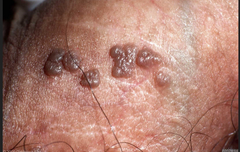
What is bowenoid papulosis? How to treat? (HINT: this is not quite the same as Bowens disease)

answer
Pigmented lesions, papules. Low malignant potential even though is technically a form of CIS. Treat: 5-FU, excision, or any other ablation (laser, cryo, etc).
question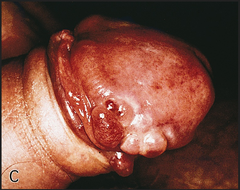
What is Kaposi sarcoma? How does one treat it?

answer
Painful tumor commonly caused by either immunosuppression or HIV. Can also be idiopathic. Treat: excise if idiopathic. If immunosuppression, then reversing immunosuppression causes tumor to regress. Otherwise use radiation or local excision.
question
What virus is associated with Kaposi sarcoma, along with HIV and severe immunosuppression?
answer
HHV-8 (Kaposi sarcoma-related herpesvirus)
question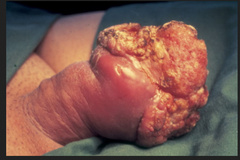
What are 2 other names for Buschke-Lowenstein Tumor?

answer
i) Verrucous carcinoma (verrucous = warty projections) ii) Giant Condyloma accuminatum
question
What sets Buscke-Lowenstein tumors apart from condylomata accuminata?
answer
Condylomata accuminata are superficial and never invade/compress adjacent tissues BL tumors displace and destroys adjacent tissue by compression. No malignant activity though, never metastasizes. Basically a larger worse form of condylomata. Associated with HPV 6 and 11.
question
How do you treat BL tumors (verrucous carcinoma)?
answer
Excision and cryosurgery. Topical treatment and radiation is ineffective (thick tumor won't allow for penetration of medication) Close f/u needed.
question
What do you call CIS of the: a) glans penis/prepuce b) body of penis/remainder of genitalia
answer
a) erythroplasia of Queyrat b) Bowens disease
question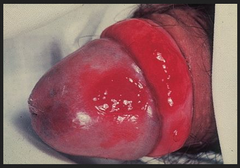
What does erythroplasia of Queyrat look like? Microscopically?

answer
Red, velvety, well demarcated lesions of glans or prepuce. Histologically, they are different from chronic balanitis in that there are atypical hyperplastic cells with hyperchromatic nuclei and mitotic figures.
question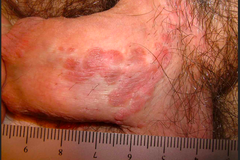
What does Bowens disease look like?

answer
Plaques (raised large lesions) of scaly erythema on penile shaft. Variants: crusted or ulcerated DDx: bowenoid papulosis, eczema, psoriasis, BCC
question
What is the risk of progression of penile CIS to invasive carcinoma?
answer
5-30%
question
Do metastases occur commonly with CIS of the penis present?
answer
No, very rare. Usually mets only with presence of actual penile carcinoma.
question
Treatment of CIS include any excisional technique and topical therapy. For excision, how large of a normal margin is needed for adequate control?
answer
5mm
question
What is the incidence invasive penile carcinoma?
answer
1/100,000
question
Does timing of circumcision affect risk of penile cancer?
answer
Yes. Neonatal circ will bring risk to 0%, whereas adult circumcision (post-puberty) offers no protection.
question
What HPV types are associated with: a) non dysplastic lesions (genital warts, verrucous carcinomas) (2) b) CIS, invasive carcinoma (4)
answer
a) HPV 6, 11 b) HPV 16, 18, 31, 33 HPV-16 = most common in met lesions
question
List 8 RF for developing penile cancer.
answer
1) Uncircumcised (neonatal) 2) Phimosis 3) HPV 4) Exposure to tobacco 5) BXO (male LS) 6) Penile trauma 7) Exposure to ultraviolet photochemotherapy (PUVA) 8) Increased sexual partners and lack of condom use
question
What is the risk of penile cancer in men with lichen sclerosis (BXO)?
answer
2-9%
question
What are 3 benefits that the American Academy of Pediatrics has cited as benefits of neonatal circumcision?
answer
1) Reduces UTI risk 2) Reduces STI transmission and prevents HIV-1 infection 3) Prevents penile cancer
question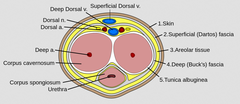
Penile cancer starts off SF and goes deep (papillary or ulcerative lesion). What layer of fascia acts as a natural initial barrier for corporeal invasion?

answer
Bucks fascia
question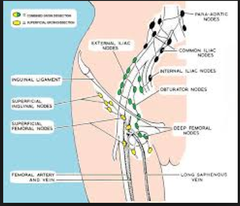
Describe the 4 stages of lymphatic drainage of the penis.

answer
Prepucial/shaft skin lymphatics --> SF inguinal nodes (external to fascia lata) --> deep inguinal nodes (deep to fascia lata) --> pelvic nodes (external iliac, internal iliac, obturator)
question
Does lymph drainage follow an ipsilateral pattern from the penile lesion?
answer
No, multiple cross connections exist at all nodal levels (drainage is bilateral to both inguinal areas)
question
What kinds of symptoms can large regional inguinal lymph nodes cause in distant spread of penile cancer?
answer
Skin necrosis, infections, hemorrhage, sepsis
question
Where do the majority of penile tumors occur on the penis?
answer
Glans and prepuce
question
Is pain a common presenting symptom of penile tumors?
answer
No
question
What is a significant cause of delay in penile cancer management?
answer
Delay in seeking medical attention.
question
What is the next step after a penile tumor has been recognized clinically?
answer
Biopsy, ensuring adequate depth
question
Histologically, SCC of the penis is classified into 6 categories. What are they (in order of incidence)?
answer
1) Usual (59%) 2) Papillary (15%) 3) Basaloid (10%) 4) Warty (condylomatous) (10%) 5) Verrucous (3%) 6) Sarcomatoid (3%)
question
Which histological subtypes of SCC carry the worst prognosis (2)? The best (1)?
answer
Basaloid and sarcomatoid (aggressive) Verrucous is most favorable.
question
What are 4 pathological predictors of increased metastatic risk?
answer
1) Stage 2) Grade 3) LVI 4) Perineural invasion
question
Although most labs are normal, what is one electrolyte imbalance associated with penile cancer?
answer
Hypercalcemia (even without bony mets). Possible explanation: tumor secretes PTH (causes bone resorption)
question
How do you treat hypercalcemia in penile cancer? (3)
answer
1) Fluid resuscitation 2) Bisphosphonates 3) Calcitonin (severe)
question
What are 2 ways to assess the primary tumor for depth of invasion?
answer
1) Physical exam (small lesions) 2) Contrast enhanced MRI (for large lesions with suspicion for corporal invasion), maybe with artificial erection as well
question
What is the gold standard for evaluating inguinal lymphadenopathy?
answer
Physical exam. Do CT in obese patients on pts with prior inguinal surgery
question
If inguinal lymphadenopathy is detected clinically, what is the next step?
answer
CT and/or PET Determine poor prognostic features and presence of pelvic/distant mets.
question
What are the grades of penile cancer?
answer
Grade 1 and 2: well differentiated Grade 3 and 4: poor differentiation
question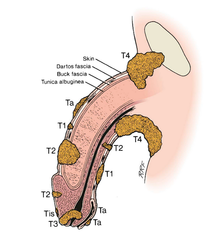
What is the T-staging of penile cancer?

answer
Tx: cannot be assessed T0: no tumor Tis: CIS Ta: noninvasive verrucous carcinoma T1a: invades subepithelial connective tissue, no LVI, low grade (1-2) T1b: invades subepithelial connective tissue, with LVI OR high grade (3-4) T2: invades corpora T3: invades urethra T4: invades adjacent structures (ex: prostate)
question
List 4 infectious lesions that could be on the differential for penile tumors.
answer
1) Chancre 2) Herpes lesion 3) Granuloma inguinale 4) TB
question
Which stages and grades of penile cancer exhibit the lowest risk of mets and therefore should be considered for penile sparing procedures? (i.e.: not partial/total penectomy)
answer
T1 and lower Grades 1 and 2
question
What are 3 methods of organ preservation surgery for penile cancers? (if partial or total penectomy is not necessary)
answer
1) Limited excision/circumcision 2) Mohs surgery 3) Laser ablation
question
What is an appropriate surgical margin for penile sparing surgical methods?
answer
0.5-1cm
question
What are 4 types of lasers used for laser ablation for lower stage/grade penile cancers?
answer
1) CO2 2) Argon 3) Nd:YAG 4) KTP
question
What are 3 characteristics of penile cancers where penile amputation (ie: partial/total penectomy) is the gold standard treatment? (HINT: stage, grade, size)
answer
1) T2 and above 2) Grade 3 and 4 3) Tumor ;4cm
question
Organ sparing for penile cancer is associated with higher recurrence rates than traditional amputation (ie: partial/total penectomy). How is early survival affected?
answer
No difference, as long as recurrences are detected and treated.
question
What is the most important prognostic factor for survival in patients with SCC of penis?
answer
Presence and extent of inguinal node metastases
question
What was the purpose of giving antibiotics when inguinal lymphadenopathy was detected in penile cancer? Why is it no longer advised?
answer
Discern infection from mets. No longer advised because it delays treatment.
question
What are 4 pathological criteria post lymphadenectomy associated with improved survival for penile cancer with nodal mets?
answer
1) 2 or less nodes involved 2) Unilateral involvement 3) No extra-nodal extension 4) No pelvic LN mets
question
List 4 complications from inguinal lymphadenectomy for penile cancer.
answer
1) Skin necrosis 2) Lymphedema 3) Seroma formation 4) Wound infection
question
What percentage of penile cancer patients with clinically non-palpable nodes actually have nodal mets?
answer
30%
question
Was there a big difference between doing early lymphadenectomy (for both non-palp and palpable nodes) and delayed lymphadenectomy (waiting until nodes are palpable)?
answer
Yes! Significant reduction in 5-year survival in the delayed lymphadenectomy group (ie: difficult to salvage patients if you observe them until they are clinically palpable).
question
What is the risk of mets with the primary penile tumor being verrucous carcinoma (Ta) or CIS (Tis)?
answer
Little to no risk of mets.
question
What are 3 histological features of primary penile tumor that would put them in the HIGH RISK for inguinal mets category?
answer
1) T1b and above 2) Grade 3 or 4 3) LVI
question
What percentage of high risk penile tumors have nodal mets?
answer
50-70%
question
What are 3 histological features of the primary penile tumor that would put them in the LOW RISK for inguinal mets category? (ie: these patients can be observed without ILND)
answer
1) Ta 2) Tis 3) T1, grade 1
question
What are 4 options for node sampling in HIGH risk penile tumor patients who have non-palpable lymph nodes?
answer
1) FNA 2) Sentinel node biopsy (extended) 3) Dynamic sentinel node biopsy 4) Superficial and modified ILND
question
Are FNA and sentinel node biopsies recommended anymore? What about DSNB?
answer
No, poor sensitivity (high false negatives). DSNB has better sensitivity but still not ideal.
question
When is an ilioinguinal LND performed (ie: deep LND and pelvic LND)?
answer
If the SF LN are positive on ILND.
question
Should unilateral ILND be done for unilateral palpable lymphadenopathy?
answer
No. Penile lymphatics have a lot of crossover, so drainage is bilateral. Do contralateral SF ILND.
question
When you are doing ILND, when should PLND be performed (2 nodal characteristics)?
answer
1) 2 or more positive ILN 2) ENE present
question
What is the management for low risk patients (Ta, Tis, T1 grade 1)?
answer
NON-PALP: Observation PALP: can give antibiotics, and if persists then FNA/excisional biopsy. ILND if abnormal.
question
What is the management for intermediate risk patients (T1 grade 2)?
answer
NON-PALP: Observation or nodal staging PALP: FNA, and if positive do ILND. If negative, can give Abx and if still persists do excision bx or proceed to ILND
question
What is the management for high risk patients (T1b and above, Grade 3-4, or LVI)?
answer
NON-PALP: DSNB, SF ILND PALP: a) Unilateral: ipsilat ILND+PLND, contralateral SF ILND b) Bilat: start bilat SF ILND, go deeper based on frozen
question
What are 4 nodal characteristics of any risk group that are associated with a higher cure rate?
answer
1) no more than 2 nodes involved 2) no ENE 3) unilateral involvement 4) no pelvic nodal mets
question
What are 2 radiation modalities to treat the primary lesion for penile cancer, should surgery not be opted for?
answer
1) External beam 2) Brachytherapy
question
What are 2 characteristics of the primary penile tumor that make radiotherapy more successfull (HINT: stage, size)?
answer
1) T2 and below 2) Size ;4cm
question
What should be done first prior to treating the primary penile lesion with radiation?
answer
Circumcision (exposes lesion, prevents subsequent edema or phimosis)
question
What percentage of penile tumors are effectively locally controlled with radiation?
answer
40-60% for external beam, 80% with brachy. The rest need curative salvage penile amputation.
question
What is the most common type of interstitial brachytherapy used for penile cancer?
answer
Iridium-192
question
What are 2 of the most common late side effects of radiotherapy to the penis?
answer
1) Meatal stenosis (1.5-2 years later) - up to 40% 2) Soft tissue ulceration
question
Should radiation be given as prophylaxis to patients with high risk penile tumors, and non-palp nodes?
answer
No. ILND is still best option. Radiation does not alter natural history of inguinal mets.
question
For clinically palpable nodes, ILND is still best option for treatment. When can adjuvant radiation be considered as well?
answer
1) ENE present 2) 2 or more nodes involved
question
Is radiation useful for inoperable nodes (bulky, fixed)?
answer
Yes. Used with chemoradiation, may allow for nodal disease to be more amenable to resection.
question
Which chemotherapy agent has been shown to have good responses in advanced metastatic penile cancer?
answer
Cisplatin-based chemo
question
If chemo achieves a good response in patients with advanced disease, what can be considered as the next step?
answer
Surgical consolidation
question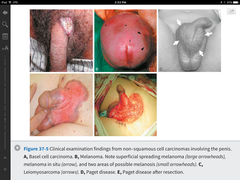
List 6 types of non-squamous penile cancers.

answer
1) Basal cell (A) 2) Melanoma (B) 3) Sarcoma (C) 4) Extramammary Paget disease (D,E) 5) Adenosquamous carcinoma 6) Lymphoreticular malignant neoplasm
question
What is a characteristic trait of sarcomas after you resect them?
answer
Local recurrences are common!
question
What is extramammary Paget disease?
answer
It is an adenocarcinoma of cutaneous origin. Looks indistinguishable from CIS. Spreads intraepidermally. Invasive EMPD is fairly lethal.
question
What is the treatment for the following non-squamous penile cancers: a) Basal cell carcinoma b) Melanoma c) Sarcoma d) EM Paget Disease e) Adenosquamous carcinoma f) Lymphoreticular malignant neoplasm
answer
a) Local excision - highly curative b) Aggressive cancer. Partial/total penile amp, and ILND if melanoma is deep, possible radiation and chemo if advanced or palliative c) SF ;2cm sarcoma = local excision; deep sarcoma (corporeal) = partial/total penile amp (no ILND needed) d) Resect skin and dermis, 3cm margin. Rarely invades deep, but need to amp if it does. e) Local excision/amp (exophytic mass), ILND if palp. f) Lymphomatous infiltration of penis, so look for other systemic signs of same disease. Treat with chemo, no surgery. May cause priapism.
question
What are 3 organs that can result in metastatic spread of their cancers to the penis?
answer
1) Bladder 2) Prostate 3) Rectum
question
What are 3 signs of mets to the penis? Which is the most common?
answer
1) Priapism (most common) - tumor replaces cavernosa 2) Swelling 3) Nodularity 4) Ulceration
question
When do most patients with mets to the penis die?
answer
Within 1 year, as mets to the penis usually indicates advanced primary disease.



